Journey into the biblical past to discover which figure fathered the most children, revealing insights into ancient family dynamics.
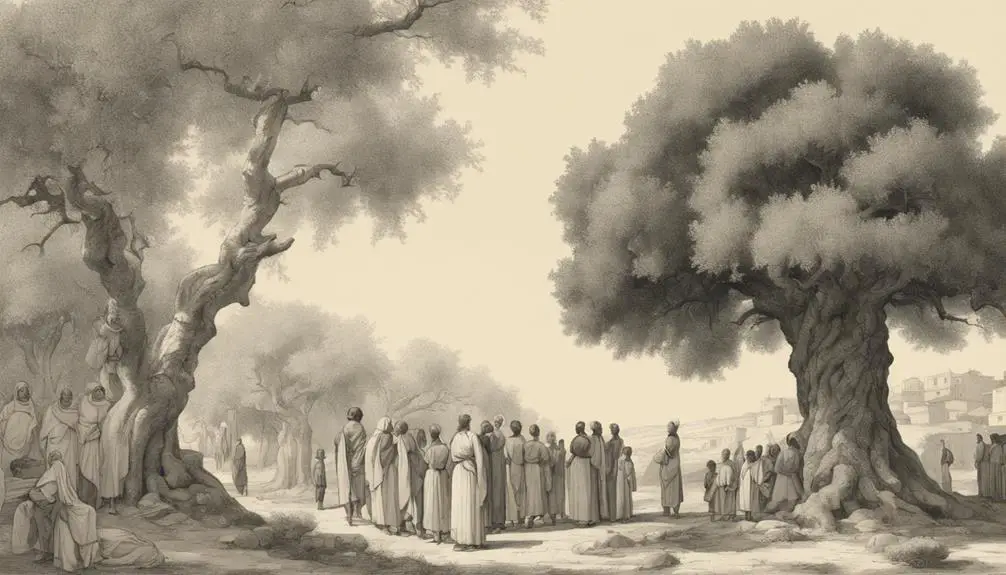
Who Had the Most Children in the Bible
In the ancient narratives of the Bible, several figures were blessed with remarkably large families, to say the least. You might be curious to learn who topped the charts in terms of progeny.
From Gideon's abundant offspring to King Solomon's sprawling descendants, the tales of their extensive lineages are not only fascinating but also shed light on the cultural and historical contexts of their times.
Yet, the question of who had the most children remains intriguing. To uncover this, you'll need to explore further, as the answer offers a glimpse into the complexities and values of biblical societies.
Key Takeaways
- Gideon had seventy sons, making him one of the most prolific biblical patriarchs.
- King Solomon's extensive progeny resulted from his many wives and concubines.
- Rehoboam fathered 28 sons and 16 daughters, showcasing significant biblical progeny.
- The musical legacy of Heman's sons highlights a different form of familial impact beyond sheer numbers.
Gideon's Abundant Offspring
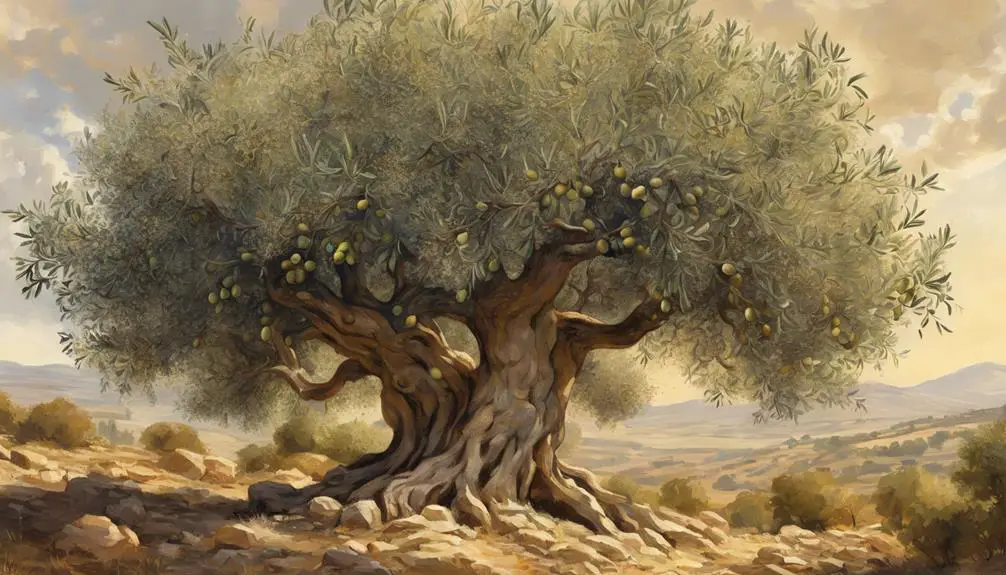
Gideon, a notable figure in the Bible, fathered an impressive seventy sons, a testament to his significant familial legacy. His story, deeply entrenched in the Book of Judges, showcases not only his role as a military leader but also highlights the complexities of biblical polygamy, an aspect that contributed to his vast progeny. Gideon's leadership, marked by divine guidance and strategic prowess, allowed him to navigate the challenges of his time, but it's his personal life that sparks intrigue and discussion, particularly his multiple wives and a concubine who were instrumental in the expansion of his lineage.
The practice of polygamy, commonly seen among prominent biblical figures, provided a means for Gideon to establish a broad family network. This network wasn't just a symbol of wealth and status but also a strategic tool in ensuring alliances and securing his legacy. While the sheer number of his offspring might seem astonishing by today's standards, within the context of his era, it underscored his influence and the societal norms that permitted and even encouraged such familial expansions.
Analyzing Gideon's abundant offspring through the lens of biblical polygamy and his leadership role offers a fascinating glimpse into the socio-political and religious fabric of the time. It helps you understand the dynamics of family structures and the importance placed on progeny for maintaining lineage and influence. Gideon's story, thus, serves as a critical case study in the broader discussion of family, leadership, and societal norms within the biblical narrative.
Jacob's Expansive Family Tree
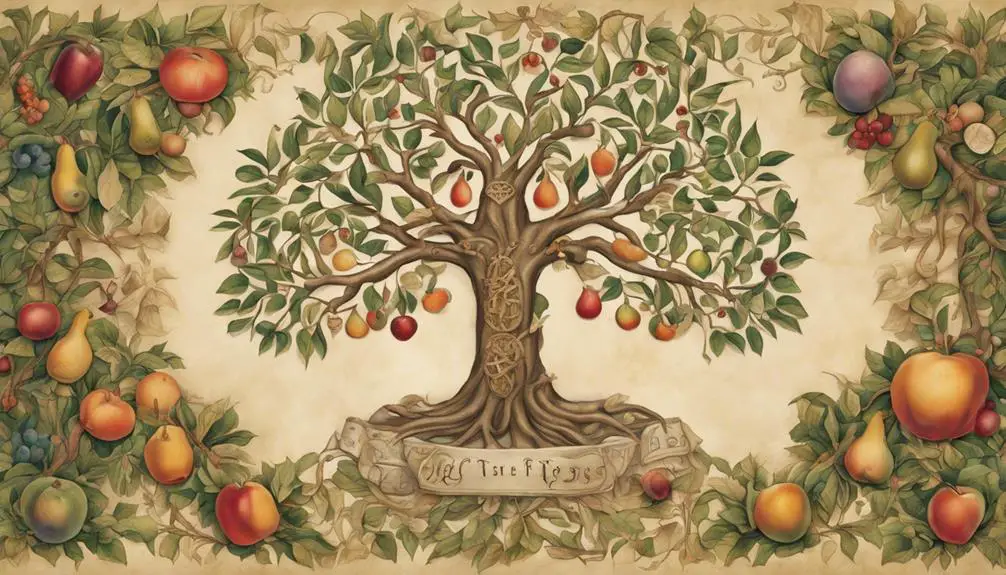
Shifting focus to another biblical figure renowned for his extensive lineage, Jacob's family tree stands as a pivotal element in understanding the complex dynamics of kinship and inheritance in biblical times. Delving into Jacob's lineage reveals a narrative rich with familial rivalry, divine interventions, and the foundational stories of the Israelite tribes.
- Leah and Rachel: Central to Jacob's family narrative are his wives, Leah and Rachel. Leah's competition with her sister, Rachel, for Jacob's affection led to the birth of many of his children. Despite initially being less loved, Leah bore Jacob six sons and a daughter, significantly contributing to the expansion of his family.
- Rachel's Sorrow: Rachel's struggle with infertility adds a poignant layer to the story. Her sorrow and subsequent prayers for children underscore the importance of offspring in biblical times. Rachel eventually bore Joseph and Benjamin, who play crucial roles in the narrative of the Israelites.
- Bilhah and Zilpah: Adding complexity to Jacob's family tree, Rachel and Leah introduced their handmaids, Bilhah and Zilpah, into the equation. These relationships further expanded Jacob's progeny, illustrating the lengths to which they went to secure their place and legacy within the family.
- The Tribes of Israel: Jacob's sons became the patriarchs of the Twelve Tribes of Israel, a testament to his extensive lineage's lasting impact on Jewish history and culture.
- Inheritance and Blessings: The stories surrounding Jacob's blessings to his sons reveal early examples of the complexities surrounding inheritance, kinship ties, and the transmission of cultural and spiritual legacies.
Analyzing Jacob's expansive family tree not only illuminates the personal lives and struggles of its members but also provides insight into the broader sociocultural and religious contexts of the time.
King Solomon's Numerous Progeny
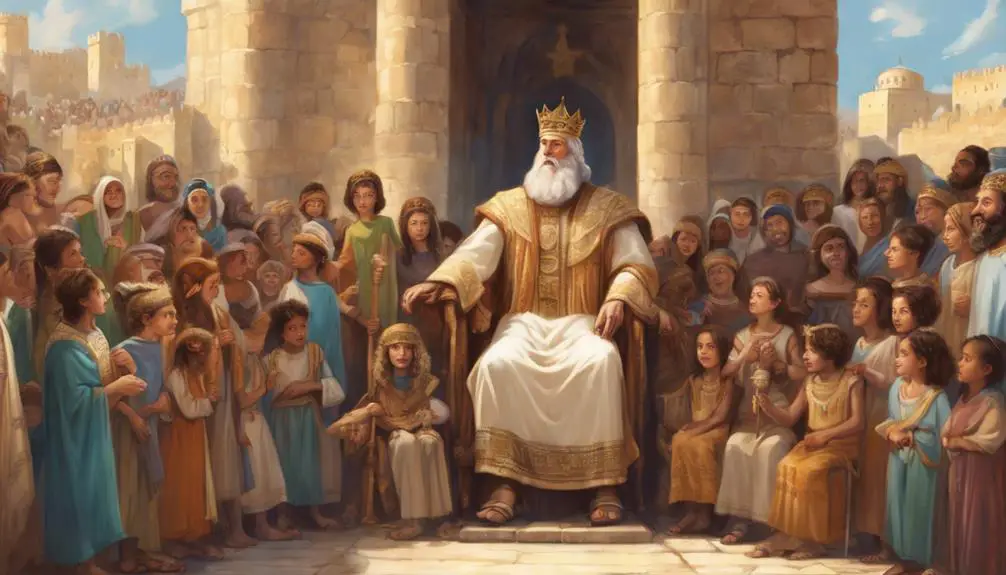
King Solomon's lineage, often noted for its vastness, reflects a complex narrative of political alliances and personal relationships that significantly shaped the history and culture of ancient Israel. Renowned for his wisdom, Solomon's decisions extended beyond governance and into his personal life, particularly in how he formed alliances through marriage. His wisdom, however, is a topic that intertwines intricately with his approach to royal polygamy.
Solomon's numerous progeny are a direct result of royal polygamy, a common practice among monarchs of his time. This practice wasn't merely about personal or sexual gratification. Instead, it served as a strategic tool, cementing political alliances and ensuring peace with neighboring states. You'll find that Solomon's marriages to foreign princesses were often tactical, designed to secure his kingdom's borders and promote trade relationships.
Yet, this approach to building alliances had profound implications for the culture and religious practices of ancient Israel. Solomon's marriages introduced foreign influences into the royal court, challenging the religious purity advocated by some sectors of Israeli society. Despite these controversies, Solomon's lineage played a pivotal role in the unfolding narrative of Israel, demonstrating the interconnectedness of personal decisions and political strategies.
In analyzing Solomon's story, it's crucial to recognize the dual nature of his wisdom and how royal polygamy was a double-edged sword. While it brought tangible benefits, it also sowed seeds of discord and division. Solomon's numerous progeny, therefore, stand as a testament to the complexities of his reign, embodying the intertwined realities of wisdom, power, and human frailty.
The Remarkable Sons of Heman
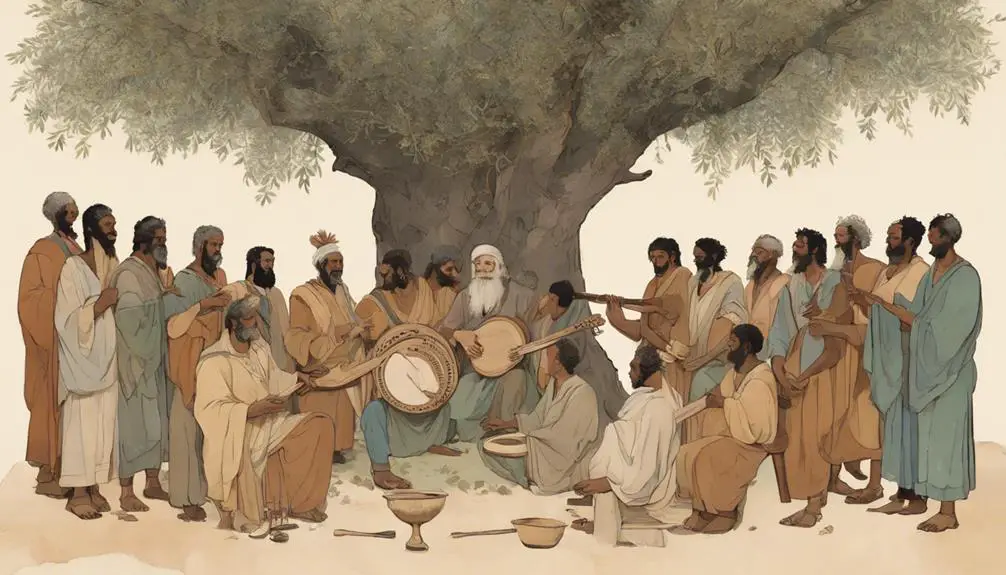
Delving into the lineage of Heman, it's clear that his sons represent a remarkable chapter in biblical history, showcasing not just familial legacy but also the intricate dynamics of divine favor and human achievement. As a Levite, Heman wasn't only a significant figure in religious ceremonies but also a musical director during King David's reign, a role highlighting the importance of musical inheritance and divine blessing in his family's story.
His sons, often overlooked, played a pivotal role in the continuation of this musical legacy, embodying the blend of divine mandate and personal talent. Their contributions are a testament to the broader theme of legacy within the Bible, where spiritual and cultural inheritances intertwine.
- Musical Inheritance: Each son inherited Heman's musical talent, playing a crucial role in temple worship, underscoring the belief that spiritual gifts are often familial.
- Divine Blessing: Their skills were seen not just as natural talent but as a divine blessing, marking them as chosen instruments of worship.
- Cultural Significance: Beyond their religious duties, they contributed to the cultural fabric of their society, preserving and promoting musical forms.
- Leadership Roles: They held leadership positions among the Levites, indicating a broader impact than just musical contributions.
- Legacy and Memory: Their story emphasizes the importance of memory and legacy in biblical narratives, showing how individual stories contribute to the collective memory of a people.
Analyzing the sons of Heman allows for a deeper understanding of how divine favor and human achievement converge, reflecting a multifaceted view of legacy in biblical history.
Rehoboam's Extensive Lineage
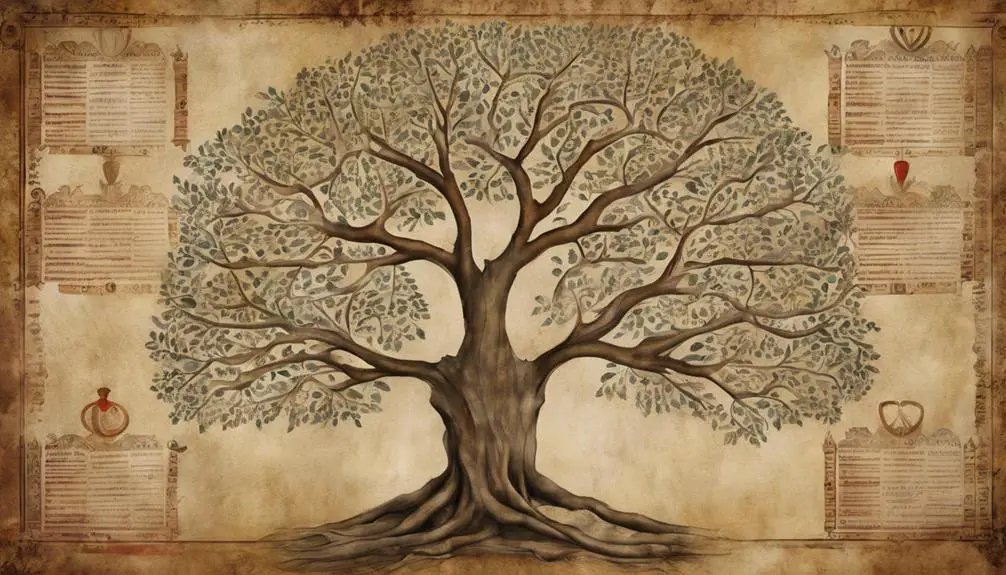
Exploring Rehoboam's lineage reveals a complex web of familial relationships that significantly impacted the socio-political and religious landscape of his time. As you delve into his family tree, it's clear that Rehoboam's leadership and the subsequent division of the Kingdom are deeply intertwined with his extensive lineage.
Under Rehoboam's reign, the Kingdom of Israel experienced a pivotal moment of division, splitting into the northern Kingdom of Israel and the southern Kingdom of Judah. This schism was not merely a political event; it had profound religious implications, altering the course of biblical history. Rehoboam's numerous offspring played various roles in this historical context, with some continuing his legacy in Judah, while others may have influenced the separated northern kingdom in less direct ways.
Wife/Consort |
Children |
|---|---|
Mahalath |
3 Sons |
Maacah |
4 Sons, 6 Daughters |
Other Wives |
16 Sons, 10 Daughters |
Total |
28 Sons, 16 Daughters |
This table simplifies the complexity of Rehoboam's family, showing a glimpse into the magnitude of his progeny. With 18 wives and 60 children, his familial decisions undoubtedly impacted his rule and how he navigated the kingdom's challenges. The division of the kingdom under his leadership reflects not just a political failure but also the culmination of internal family dynamics and alliances that influenced his decisions and, by extension, the fate of the Israelite people. Understanding Rehoboam's extensive lineage thus provides critical insights into the broader narrative of biblical history and its interconnectedness with personal and familial legacies.
Moses and His Descendants
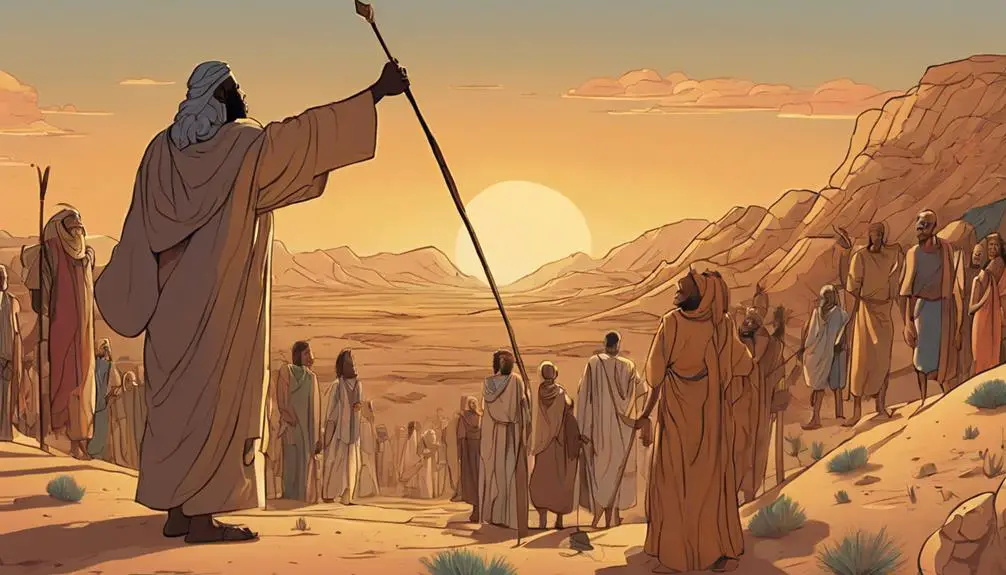
Turning our attention to Moses and his descendants, we find a significant yet less discussed aspect of biblical genealogy that offers insights into the continuation of his legacy. While Moses' leadership is prominently documented, often highlighting his role in leading the Israelites out of Egypt and receiving the Ten Commandments, the narrative surrounding his family life, particularly his descendants, is less prevalent. However, understanding this aspect sheds light on how his lineage contributed to the broader biblical story.
Moses was married to Zipporah, the daughter of Jethro, a Midianite priest. Zipporah's role, though not as extensively covered as Moses', was crucial in the early part of his journey. Together, they had two sons, Gershom and Eliezer.
- Gershom's name, meaning 'I have been a stranger in a foreign land,' reflects Moses' life experiences.
- Eliezer, meaning 'My God is help,' signifies Moses' gratitude and reliance on divine assistance.
- The direct descendants of Moses through Gershom and Eliezer aren't extensively documented, suggesting a focus on Moses' spiritual rather than biological legacy.
- Zipporah's role, while supportive, hints at her significant yet behind-the-scenes influence in Moses' life and decisions.
- The narrative focuses more on Moses' leadership and the establishment of a covenantal relationship with God rather than on extending his biological lineage.
In analyzing Moses and his descendants, it's clear that the biblical text prioritizes his role in shaping the spiritual destiny of the Israelites over detailing his family tree. This approach underscores the idea that Moses' true legacy wasn't his descendants but the enduring impact of his leadership and faith.
Frequently Asked Questions
How Did the Cultural and Historical Context of the Time Influence the Large Family Sizes Mentioned in the Bible?
In the historical and cultural context of ancient times, large families were highly valued. You'd find that agricultural benefits significantly influenced this trend, as more children meant more hands to work the land, boosting productivity and ensuring family sustenance.
Additionally, having many offspring was a symbol of social status, indicating wealth and the ability to support a large family. This societal structure deeply impacted family size preferences back then.
Were There Any Health Implications or Challenges Faced by Women in the Bible Due to Having Many Children?
Certainly, women faced numerous health challenges due to having many children. Maternal mortality rates were likely high, as childbirth practices weren't as advanced as today. Without modern medical interventions and understanding, complications during childbirth could easily become life-threatening.
Additionally, the physical toll of repeated pregnancies could lead to long-term health issues. These challenges were significant, reflecting the harsh realities of maternal health in ancient times.
How Did Having a Large Number of Children Affect the Inheritance and Distribution of Wealth Among Biblical Families?
In biblical times, having a large number of children significantly impacted family dynamics and inheritance distribution. Legal reforms were often necessary to manage the division of wealth fairly among offspring.
This situation complicated family relationships, as parents had to navigate the delicate balance of ensuring each child received their due share. Such dynamics underscore the intricate interplay between family size and wealth distribution, highlighting the challenges of managing a large family's assets.
In Biblical Times, How Was the Responsibility of Child-Rearing Distributed Within These Large Families?
In biblical times, child-rearing in large families often involved communal efforts. Both parents played significant roles, with paternal roles especially emphasized in child education and discipline. It wasn't just a matter of feeding and clothing; imparting moral values and skills was key.
Relatives and older siblings also pitched in, creating a support network. This distribution ensured every child received attention, despite the size of the family.
How Do Modern Interpretations of the Bible View the Concept of Having Many Children in the Context of Current Environmental and Economic Concerns?
As you ponder the modern interpretations of the Bible, it's like opening a window to a world where population control and sustainable living are at the forefront.
Analysts and theologians alike delve into these texts, finding guidance that balances the blessing of children with the responsibilities of stewardship over Earth's resources.
They argue that the scripture supports a life that's both fulfilling and mindful of our environmental and economic challenges.
Conclusion
In analyzing the biblical narratives, it's clear that fertility was more than a mere measure of progeny; it was a canvas for divine narratives and blessings. Among the mentioned figures, Gideon, Jacob, Solomon, Heman, and Rehoboam, each played a pivotal role in the biblical genealogical tapestry.
However, it's Solomon's lineage that often captures the imagination, marrying wisdom with a vast progeny. Like stars in the sky, these biblical figures' descendants illuminate the depth and breadth of familial legacy in sacred texts.

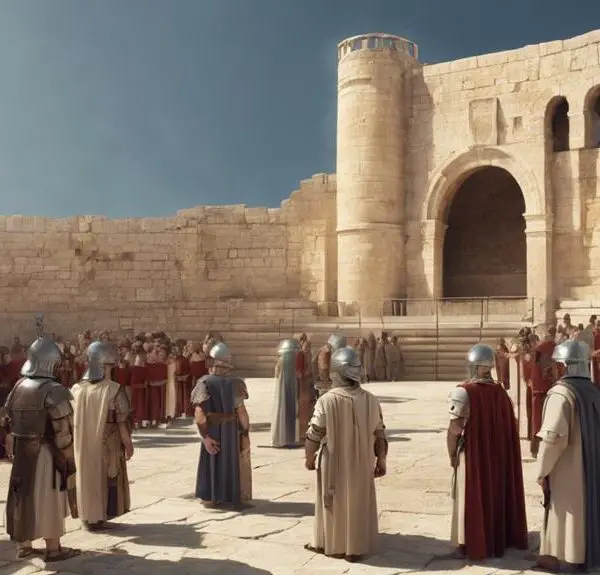

Sign up